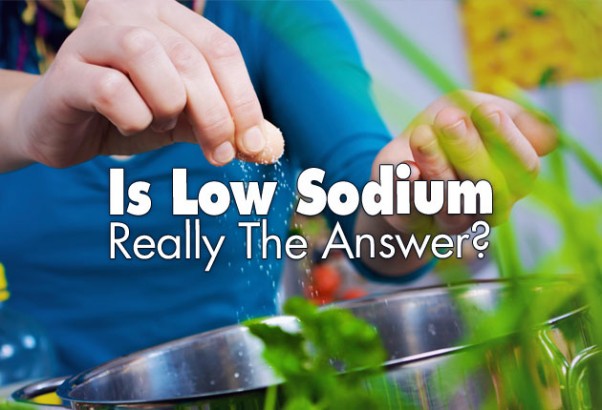For the past five weeks, we have been sharing the reasons why the ‘World’s Diet’ is such a dangerous diet. In this Health Tip we are going to examine a substance that contains no fiber and is extremely toxic to the body, yet is consumed by almost every man, woman and child each and every day on The Standard American Diet: table salt.
Controversy and Confusion
Did you know that the Bible talks about salt? In Matthew 5:13 the reference to salt comes directly from the lips of Jesus as He addresses His disciples in the Sermon on the Mount:“Ye are the salt of the earth: but if the salt has lost his savour, wherewith shall it be salted? It is thenceforth good for nothing, but to be cast out, and to be trodden under foot of men.”
Biblically, the believers in Jesus Christ is referred to as the “salt of the earth” because they are the preserving force on earth withholding God’s judgment upon this earth and the people that inhabit it. Salt has also been used in the human diet for thousands of years as a preservative as well as for the seasoning of foods. Up until recently, we have been led to believe that all salt is a deadly poison and that there was no place for it in our diet. These beliefs were once my beliefs and possibly yours, but these beliefs have been challenged in recent years and need to be revisited for our health's sake.
Table Salt
Table salt is a refined, processed, and bleached salt, consisting of 100% sodium chloride, with toxic substances added. When sodium chloride is consumed in this manner, it becomes a very addictive and toxic substance that does great harm to the body. Yet, the compound is essential for cellular health and the proper functioning of the body. How do we explain this paradox? In this health tip we will attempt to show why one form of salt, table salt, is a toxic and dangerous substance when placed into the body, while several other forms of salt, as found naturally occurring in nature, are essential to the health. Refined salts, as found on grocery store shelves, on restaurant tables, and in most manufactured and restaurant foods, is a toxic and dangerous substance that needs to be avoided as much as possible. Here’s why. The refining process removes 82 of the 84 naturally occurring minerals, while having chemicals added to prevent it from absorbing moisture. This enables it to flow freely from the salt shaker. It is then bleached similar to the process used to whiten refined sugar and flour. Dr. Esterban Genao, a Florida pediatrician stated in an interview, “I am convinced that the refining of salt, the refining of sugar, and of oils, is going to be shown to be responsible for a great majority of our physical problems.”
What's Wrong With Table Salt
(1) Mineral Depletion Table salt leads to a poorly functioning immune system along with the initiation and acceleration of chronic illness. It depletes calcium, potassium, and magnesium and is directly related to cardiovascular disease. The ingestion of large amounts leads to mineral deficiency.
(2) Acid Formation Due to its lack of buffering minerals, it becomes an acidifying substance within the body, and joins the other acidifying substances found in the “World’s Diet.” All animal products (both flesh and dairy), all refined sugars, and refined flour are acidifying, making it difficult for the body to maintain its alkalinity.
(3) Fluid Imbalance Table salt is toxic to the body and responsible for upsetting the fluid balance, debilitating the circulatory system, and aggravating a number of salt pathologies. One ounce of ingested table salt will cause the body to retain 3 quarts of water (6 pounds of excess bodily fluids), in an attempt to dilute this extremely toxic substance. A seriously overweight person once told me they lost 22 pounds their first week on The Hallelujah Diet. How? The body was releasing the water it was retaining to keep that toxic sodium and chloride in suspension.
(4) High Sodium Intake The average person consuming the Standard American Diet (SAD), consumes anywhere from 4,000 to 10,000 mg of sodium daily. Sources for table salt would include:
- diet soda - 550 mg
- 6 oz serving bottled vegetable juice - 555 mg
- 2 slices of bread - 1090 mg
- 1.5 oz natural cheese - 593 mg
- 1 tbsp salad dressing - 333 mg
- 10 oz canned soup - 1547 mg
- hamburger - 800 mg
- scramble egg and sausage - 1411 mg
- quarter pound cheese burger - 1950 mg
- 4 oz frozen fish - 1080 mg
- 2 oz ham - 1578 mg
- 1 oz potato chips - 300 mg
- Mexican style frozen dinner - 2,300 mg
- ¼ frozen pizza - 1389mg
(5) Addiction Table salt is highly addictive and disease promoting. Even with all the table salt contained in manufactured foods, many people will add more salt to their food from a salt shaker. Often, when people first adopt The Hallelujah Diet they consider the food tasteless. That is because their taste buds have been dulled by their previous use of table salt. Fortunately, on a basically living foods, plant-based diet, the cells of the taste buds will rebuild in about 2 weeks, and the plant-source foods will start to taste wonderful.
(6) Disease Table salt either causes or aggravates a host of salt sicknesses - including but not limited to: edema, obesity, hypertension, coronary heart disease, myocardial infarction, angina pectoris, stroke, congestive heart failure, kidney failure, PMS, manic-depression, and the list goes on.
(7) High Blood Pressure Table salt is a contributing cause of high blood pressure. Many people could be off blood pressure medicine, and experiencing normal blood pressure, if they would simply eliminate table salt from their diet.
The Importance of Essential Minerals
Though we have severely condemned table salt, it cannot be emphasized strongly enough that the body needs salt (sodium and chloride) to function properly and both can be found naturally occurring in the living plants God placed in garden. Yes, the very foods God told us we should eat for the proper nourishment of our body in Genesis 1:29 contain both sodium and chloride, and these garden foods should be the primary source of these essential minerals.
Sodium Chloride
Salt (sodium chloride) is an absolute necessity for optimum health. Sodium chloride is responsible for maintaining fluid balance, regulating the circulatory system, and normalizing nerve impulses.
Sodium/Potassium Pump
Every cell within the body has both an extracellular fluid and an intracellular fluid within the cell membrane acting as a sodium/potassium pump to transport ions back and forth across the membrane into and out of the cell. The extracellular fluids have higher concentrations of sodium chloride and bicarbonate ions. Intracellular fluids have higher concentrations of potassium, phosphate, and magnesium ions. Maintaining proper mineral balances and proper fluid volumes is vital to optimal functioning of each cell. (“Human Anatomy and Physiology”, 5th edition, John W. Hole Jr., page 796).
The Nervous System
The human body operates on electrical impulses by way of the nervous system. These impulses are controlled by sodium ions. When sodium levels are out of balance, abnormal electrical signals may occur. Dr. Brownstein tells us that “Without an optimal balance of the various vital minerals, it is impossible for the brain to function optimally.”
The Adrenal Glands
The adrenal glands monitor energy levels, blood sugar, blood pressure, muscle strength, and more. By secretion of other hormones the adrenals keep these functions in check. A diet deficient in salt or a diet deficient in other minerals can lead to suboptimal adrenal function and eventual adrenal exhaustion. Some possible consequences of adrenal exhaustion would include: fatigue, impaired immune system, thyroid disorders, arthritis, fibromyalgia, chronic fatigue, autoimmune disorders etc.
What's The Difference?
Sodium and chloride as found in plant foods differ greatly from the sodium and chloride found in table salt in the following ways:
- Sodium chloride, as found in the living plant, is an unrefined and non-toxic (organic) form.
- Sodium chloride is found naturally occurring in fresh fruits, vegetables, seeds, and nuts, and has received no processing.
- Sodium chloride is totally usable by the body and is in an easily assimilable form when derived from living plants. Plant-source (organic) sodium chloride contributes to our health.
- The body needs only about 250 mg of sodium each and every day in order to carry out necessary functions.
- Chloride controls diffusion and the exchange of new and worn-out material in the cells.
- Organic sodium occurs naturally, and in adequate amounts in the LIVING plants and vegetable juices of The Hallelujah Diet. Following is the amount of sodium found in a 3 1/2 ounce serving of:
- beets - 60 mg
- celery - 125 mg
- figs (dried) - 35 mg
- kale - 75 mg
- sesame seeds - 60 mg
- sunflower seeds - 30 mg
- red peppers - 10 mg
- radishes - 18 mg
- raisins - 27 mg
- spinach - 70 mg
Unrefined Sea Salt
The most natural source of sodium after plant sourced sodium is unrefined sea salt, which boasts over 80 minerals and other elements that are useful to the body and that are missing in refined table salt. Celtic Sea Salt, which is one of the unrefined sea salts recommended by Hallelujah Acres, is harvested in Brittany, near the Celtic Sea, in the northwestern part of France. Here the sea water is evaporated and the resulting grayish color salt is hand raked. The method used follows a 2,000-year-old Celtic tradition. The sodium chloride content of natural unrefined sun dried Celtic Sea Salt is as low as 84% in the Light Gray variety (compared to 100% in refined earth and sea salts), water about 14%, and the remaining 2% is a vast array of approximately 80 naturally occurring trace minerals.“Celtic Sea Salt has the ability to keep all bodily fluids, including the blood, in a balanced state. When a body exists in this state of equilibrium, known as homeostasis, the immune system will be strong, the metabolism will be healthy, and bodily organs will be able to easily function.” Dr. Esteban Genoa
Hallelujah Acres offers two varieties of Celtic Sea Salt – the light gray, medium size crystals, which are slightly moist since they are just sun dried, and the Fine Ground Celtic Salt, which is ground on granite stones and then sifted. Eden Foods also offers an unrefined sea salt harvested from Brittany which appears equal to Celtic Sea Salt. We believe either of these to be a good option for those who desire to conservatively use some salt on their foods and in their food preparation. These salts will not only improve the flavor of the food but also offer some benefits to the body at cellular level. If we want to have a healthy, properly running physical body, it needs salt, but let’s make sure it is in a form that promotes health (unrefined sea salt) rather than in a form that harms our health (refined table salt).
Join us next week as we discuss another substance that is necessary for health and the proper functioning of the body — but can be detrimental in the wrong form.








